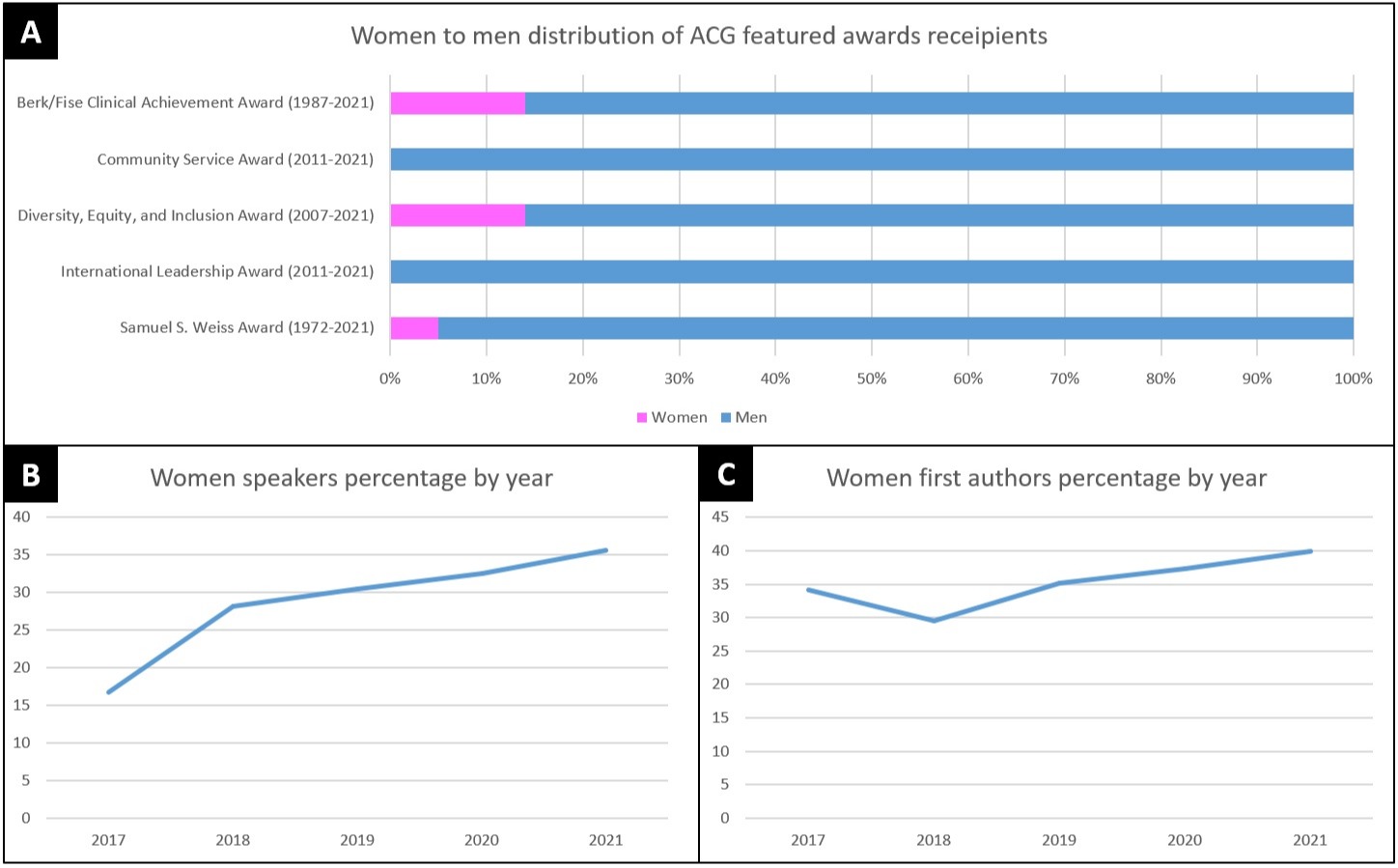Back


Poster Session E - Tuesday Afternoon
Category: Practice Management
E0619 - Women's Participation and Representation at the ACG Meetings: An In-Depth Analysis of Trends
Tuesday, October 25, 2022
3:00 PM – 5:00 PM ET
Location: Crown Ballroom

Has Audio

Ahmad Karkash, MD
Indiana University School of Medicine
Indianapolis, IN
Presenting Author(s)
Ahmad Karkash, MD1, Razan Aljaras, MD1, Maryam Haider, MD2, Eleazar E. Montalvan-Sanchez, MD1, Renato Beas, MD3, Rawan Aljaras, MD3
1Indiana University School of Medicine, Indianapolis, IN; 2Wayne State University/Detroit Medical Center Sinai Grace Hospital, Detroit, MI; 3Indiana University, Indianapolis, IN
Introduction: Gender gap in Medicine is real. Top male dominated specialties include orthopedic and neurological surgeries, but gastroenterology (GI) does not lag far behind. According to an article published by the American Medical Association (AMA): 82.4% of all gastroenterologists are men, and only 25% to 30% of trainees in the field are women. This study aims to describe women participation and representation at national ACG meetings.
Methods: Data from the ACG database and conference materials was gathered for analysis in the different categories. These categories included presidents of the ACG for the years (2000-2021), masters of the ACG and featured faculty awards over the years, first authors and faculty speakers including post-graduate course faculty and featured lectures over the past 5 years (2017-2021). Statistical analyses on first authors and faculty speakers data were conducted with the Cochran-Armitage trend test. A p-value of < 0.05 was deemed to be statistically significant.
Results: In the 21-year period, ACG had 18 men (86%) and 3 women (14%) serve as Presidents. Eight percent of all Masters of the ACG were women. Proportions of women receiving ACG featured awards over the years are shown in (Figure A). Looking at trends from 2017-2021, the proportion of women serving as faculty speakers increased from 16.7% to 35.6% with statistically significant results (z=4.28; p< 0.0001), detailed percentages and trend are shown in (Figure B). There was a noted increase in participation of women as abstract first authors between (2017-2021), the percentage has increased from 34.1% to 39.9%, also with statistically significant results (z=5.51, p< 0.0001), detailed percentages and trend are shown in (Figure C).
Discussion: Overall, there has been an increase in representation and potentially subsequent encouragement of participation of women at the ACG meetings in the past years, especially when comparing proportions of women participants from different levels of training and practice to percentages of practicing women gastroenterologists in the field.

Disclosures:
Ahmad Karkash, MD1, Razan Aljaras, MD1, Maryam Haider, MD2, Eleazar E. Montalvan-Sanchez, MD1, Renato Beas, MD3, Rawan Aljaras, MD3. E0619 - Women's Participation and Representation at the ACG Meetings: An In-Depth Analysis of Trends, ACG 2022 Annual Scientific Meeting Abstracts. Charlotte, NC: American College of Gastroenterology.
1Indiana University School of Medicine, Indianapolis, IN; 2Wayne State University/Detroit Medical Center Sinai Grace Hospital, Detroit, MI; 3Indiana University, Indianapolis, IN
Introduction: Gender gap in Medicine is real. Top male dominated specialties include orthopedic and neurological surgeries, but gastroenterology (GI) does not lag far behind. According to an article published by the American Medical Association (AMA): 82.4% of all gastroenterologists are men, and only 25% to 30% of trainees in the field are women. This study aims to describe women participation and representation at national ACG meetings.
Methods: Data from the ACG database and conference materials was gathered for analysis in the different categories. These categories included presidents of the ACG for the years (2000-2021), masters of the ACG and featured faculty awards over the years, first authors and faculty speakers including post-graduate course faculty and featured lectures over the past 5 years (2017-2021). Statistical analyses on first authors and faculty speakers data were conducted with the Cochran-Armitage trend test. A p-value of < 0.05 was deemed to be statistically significant.
Results: In the 21-year period, ACG had 18 men (86%) and 3 women (14%) serve as Presidents. Eight percent of all Masters of the ACG were women. Proportions of women receiving ACG featured awards over the years are shown in (Figure A). Looking at trends from 2017-2021, the proportion of women serving as faculty speakers increased from 16.7% to 35.6% with statistically significant results (z=4.28; p< 0.0001), detailed percentages and trend are shown in (Figure B). There was a noted increase in participation of women as abstract first authors between (2017-2021), the percentage has increased from 34.1% to 39.9%, also with statistically significant results (z=5.51, p< 0.0001), detailed percentages and trend are shown in (Figure C).
Discussion: Overall, there has been an increase in representation and potentially subsequent encouragement of participation of women at the ACG meetings in the past years, especially when comparing proportions of women participants from different levels of training and practice to percentages of practicing women gastroenterologists in the field.

Figure: A- Percentages of women recipients of featured ACG awards over the years.
B- Percentages of women serving as faculty speakers between (2017-2021).
C- Percentages of Women participating as abstract first authors between (2017-2021).
B- Percentages of women serving as faculty speakers between (2017-2021).
C- Percentages of Women participating as abstract first authors between (2017-2021).
Disclosures:
Ahmad Karkash indicated no relevant financial relationships.
Razan Aljaras indicated no relevant financial relationships.
Maryam Haider indicated no relevant financial relationships.
Eleazar Montalvan-Sanchez indicated no relevant financial relationships.
Renato Beas indicated no relevant financial relationships.
Rawan Aljaras indicated no relevant financial relationships.
Ahmad Karkash, MD1, Razan Aljaras, MD1, Maryam Haider, MD2, Eleazar E. Montalvan-Sanchez, MD1, Renato Beas, MD3, Rawan Aljaras, MD3. E0619 - Women's Participation and Representation at the ACG Meetings: An In-Depth Analysis of Trends, ACG 2022 Annual Scientific Meeting Abstracts. Charlotte, NC: American College of Gastroenterology.
